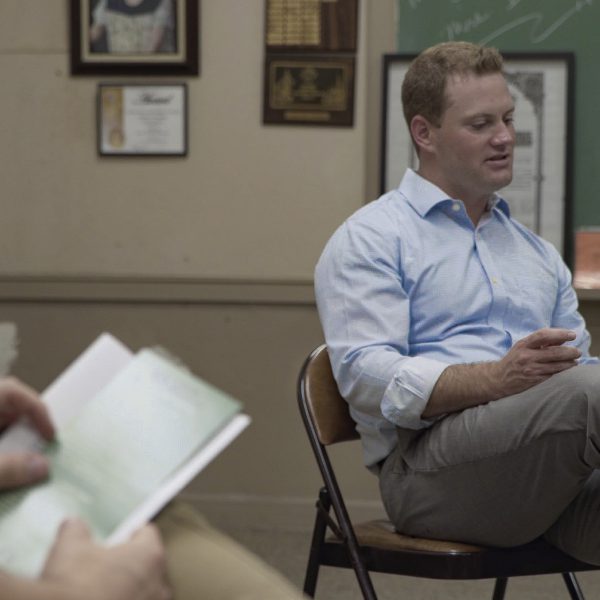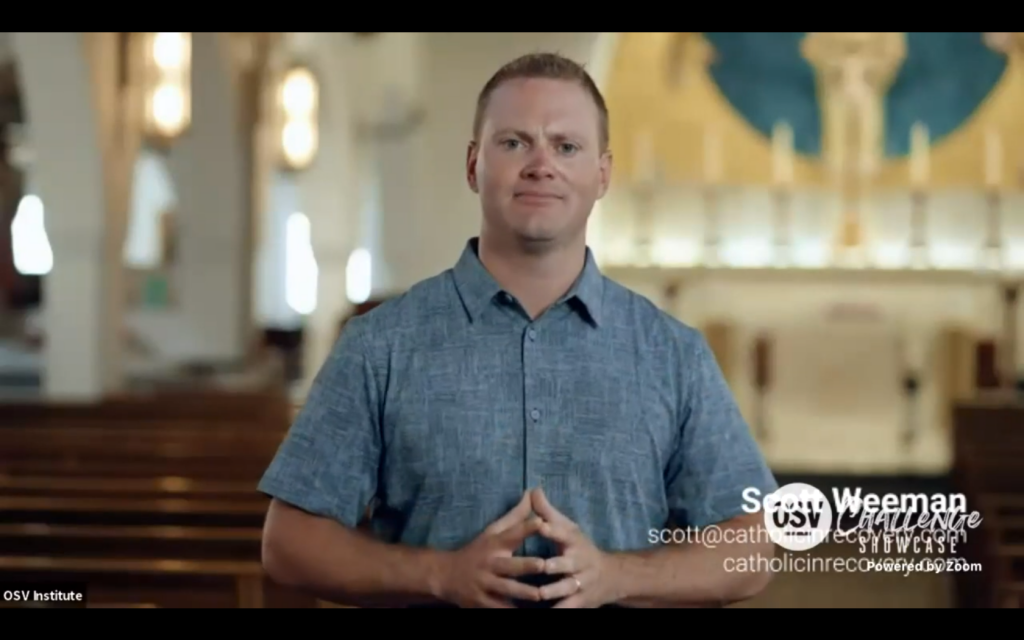SAN DIEGO – Scott Weeman started Catholic in Recovery because he wanted to share with others the healing that he had found through the combination of 12-step recovery programs and the sacraments of the Catholic Church.
Inspired by his own experience, the nonprofit ministry promotes addiction recovery through the lens of the Catholic faith.
Weeman launched his ministry in the spring of 2015 with a website, catholicinrecovery.com. The following year, he began supplementing his online offerings with a series of speaking engagements. It was at those talks, where audience members often had the opportunity to share their own stories and seemed eager to do so, that he saw the need for Catholic in Recovery to provide even more.
In January 2017 at St. Joseph Cathedral in San Diego, Catholic in Recovery started its first fellowship group, where those impacted by any form of addiction can meet regularly to share their struggles and celebrate their triumphs. Other groups followed in quick succession.
Today, there are 31 such groups active in 10 states, including Oregon, Nevada, Minnesota, Michigan, Ohio and New York. There are currently three groups in the Diocese of San Diego alone.
“I never would’ve imagined how much God and the Holy Spirit allowed the mission of Catholic in Recovery to really move so quickly. It’s been pretty awesome to see the rapid growth,” said Weeman, 35, who began his recovery in late 2011.
He was able to break free after nine years of alcohol and drug addiction, thanks to the recovery programs he participated in and the spiritual home that he found with the young adult community at St. Brigid Catholic Parish in San Diego. He now serves as the co-coordinator of the parish’s young adult ministry with his wife, Jacqueline, whom he met through the young adult group.
Catholic in Recovery, which received its nonprofit status in April 2016, offers different types of fellowship groups.
Some, like the one at St. Joseph’s Cathedral, are “general recovery” groups that are open to those who are currently struggling with or have broken free from a wide variety of addictions, including substance abuse, sex and pornography, gambling, and compulsive overeating, as well those dealing with mental and emotional health issues like anxiety, depression and grief.
There are also groups with a narrow focus on pornography and sex addiction, as well as groups for friends and family members affected by a loved one’s addiction.
Attendance numbers vary, but Weeman said that an average of 10 to 12 people attend the typical meeting. Because “addiction does not discriminate,” he said, those meetings attract a diverse group of people, even non-Catholics.
At the typical meeting, attendees are welcomed with coffee and refreshments. The meetings open and close with prayer. In between, there are opportunities to make introductions, celebrate any significant milestones of sobriety, reflect on the upcoming Sunday Mass readings, and share what is currently going on in each participant’s life.
Weeman, who attends two of the fellowship groups in San Diego, maintains regular communication with Catholic in Recovery group leaders nationwide to ensure a consistency that would allow someone to attend a meeting anywhere in the country and encounter something very similar. At the same time, he said, cultural differences from region to region will inevitably result in elements unique to a particular group, and that is perfectly fine.
Weeman recalled having had the opportunity to attend meetings of Catholic in Recovery groups in Cincinnati and Columbus during a visit to Ohio last October.
“That was a really great gift for me to attend a meeting that was happening outside of San Diego,” he said, “and to see the same thing happening – people finding freedom and new life, people with a variety of different addictions coming together and uniting in the common solution of relying on God’s will for us, and family members who were just desperately trying to find freedom from the agony of their loved one’s addiction.”
Weeman, who describes Catholic in Recovery as his “full-time mission and ministry,” provides one-on-one support to group leaders nationwide and also has a weekly meeting with them via videoconferencing software. Group leaders can print out weekly reflections for each fellowship meeting and watch instructional videos on such practical subjects as how to set up a room.
And Weeman is continually receiving inquiries from those interested in starting new groups. He said he gets an average of about two to three each week. He has even received requests for Catholic in Recovery resources from outside the United States, including from Australia, Japan, the Philippines, and various countries in Europe and South America.
Weeman, whose book The Twelve Steps and the Sacraments: A Catholic Journey Through Recovery was published in late 2017 through Ave Maria Press, said the growth of Catholic in Recovery has come about without “really doing any intentional marketing.”
As Catholic in Recovery’s executive director, he has been personally responsible for management and development of the fellowship groups, fundraising, administration and much of the content production for his organization. New Eve Media, based in San Diego, assists him with Catholic in Recovery’s social media networks and its monthly newsletter, and Weeman also has a content director, Chris Hazell, who manages the team of volunteers who write for the newsletter and blog. But, he said, its rapid growth is “stretching” the ministry to the point where he is looking hire a staff to help with the increasing number of groups nationwide and to provide additional Catholic resources to serve individuals and families.
A little over two years ago, Jean (last name withheld) started attending a Catholic in Recovery group for friends and family of addicts.
Jean, 61, has a son who has been addicted to drugs for 12 years and has “almost died probably seven times” during that period, she said, and she was seeking a sense of peace as she dealt with this trying situation.
Jean said she had tried other support groups, but they never seemed to be a good fit for her, and she would ultimately stop attending. However, Catholic in Recovery was different. It was the organization’s Catholic character that seemed to make the difference.
“I felt like I was in a safe place,” she said, “and I felt normal, like people understood when I wanted to talk about God in the context of my faith, and the sacraments, and Mary, and all that kind of stuff.”
After a few months attending the friends and family group, a fellow group member suggested that she consider attending one of the “general recovery” groups as well.
At first, she thought, “I don’t have a problem. I don’t need to go. If only my son would get his act together, everything would be great.”
But, although she had come to Catholic in Recovery because of her son’s drug problem, she came to realize that she had her own addictions that she needed to overcome, including marijuana use as well as struggles with overeating and excessive shopping.
About a year ago, Jean accepted Weeman’s invitation to start a new Catholic in Recovery group based at St. Luke Parish in El Cajon, California, in eastern San Diego County.
Jean said what makes Catholic in Recovery unique is that it’s Catholic and participants are free to discuss “everything that we have as Catholics,” including “that whole toolbox” that includes the Eucharist, confession, and sacramentals like holy water.
She has seen changes in herself as a result of her participation.
“It gives me what I’ve been looking for all these years that I never had, and now I don’t care about who I tell my story to,” said Jean, whose addictions had previously been a source of shame. “It’s given me strength.”
Though her son is still dealing with a drug problem, she said, her experience with Catholic in Recovery has also improved her relationship with him.
“We’re really, really close now,” she said, “and when I talk to him, I talk to him at a place of understanding the struggle and that I love him no matter what.”
“It’s just a healthy conversation now,” she added, “because he knows I’m in recovery. We’re both rooting each other on.”





